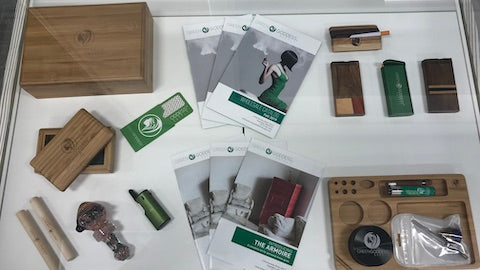Posted on April 07 2023
By: Eric Robichaud -
This industry, today, reminds me in some ways of the tech industry in the late 80’s – it’s the Wild West! I’ve been fortunate to witness the initial emergence of both fledgling industries. I began my career in the late 80’s as a software engineer, and spent the next 30 years running tech industry businesses before completely changing tracks and jumping into the greater canna industry seven years ago.
In the late 80’s and early 90’s we had pimply-faced tech nerds building and selling PCs out of their dorm rooms and others sleeping under their desks, on the verge of bankruptcy, banging out software. By 2000 they had grown into titans of the industry, running multi-billion-dollar companies such as Dell and Microsoft. Before they came along, there was no such thing as a “personal computer” – they helped birth an entire industry. It was chaotic, and everyone was trying to figure out business models on the fly. In the early 90’s I was Chairman of the Association of Shareware Professionals evangelizing “try before you buy” and trialware software business models back when nobody understood the concept, and Microsoft Word was sold in a box at Radio Shack for $500.
Those early days were fun and exciting but also perilous, with no rules. There were certainly many winners and losers along the way. But fast forward even just twenty years later, never mind forty, and the industry had matured. Witness software distribution, for example: if you wanted to get into chain X you needed to call on Ingram Micro. If you wanted to get into chain Y you had to call Tech Data. There were 3 or 4 distributors and the process was relatively organized, and clear.
Contrast that with the cannabis industry where everyone sells to everyone! For hard goods, there are over 100+ distributors if there’s one. And every cultivator and manufacturer is selling to every retail shop. It’s near insanity.
In my opinion, while there’s certainly lots of innovation going on in the tech space, the industry itself has matured and become incrementally progressive. This is one of the reasons I was drawn to this industry – it was like the 80’s all over again! It’s the birth of a whole new industry, and the players are all pioneering things and figuring them out on the fly. Business models are constantly evolving. It’s fresh, new and exciting!
But this is also the downside to the industry, with so many businesses in the cannabis industry being started by first-time business owners. Then, ladle in the fact that most at this point are still historical stoners, with the baggage that entails. The entire industry is incredibly unprofessional. Anyone who has read the book “The E-Myth” by Michael Gerber will understand what I’m talking about: just because you’re great at growing phenomenal weed, that doesn’t mean you’re good at running a company that produces phenomenal weed.
Eventually there will be consolidation, and as the stigma associated with cannabis continues to dissipate and legalization hurdles are cleared, the industry will mature and professional managers will become much more common. But we’re not quite there yet.
Every day I see new shops opening and perpetuating many of the same mistakes, over and over again, because they don’t know any better. I walk into retail stores and talk about things like co-op marketing programs and they look at me like I have two heads, despite the fact that this has been common practice for literally decades in other industries. Or, they think I’m a genius, but I just chuckle to myself: In the land of the blind, the one-eyed man is king!
There are two areas right now where I see cannabis retailers leaving a lot of money on the table: accessory sales, and the home grow market.
Do You Want Fries With That?
It absolutely astounds me how many pot shops do not sell accessories. And many stores that do technically sell accessories will have them pushed off to the side or at the back of the store like an afterthought, where they are out of sight and out of mind to the retail customer. These first-time business owners are so fixated on the cannabis products themselves that they have blinders on! I understand that the average upscale Apple-Store-like retailer doesn’t want to turn their space into a cluttered headshop. I get that. But there’s a lot to be said for hosting a curated collection of quality products – the more common staples that the average consumer will pick up as an impulse buy at point of purchase. “Oh yeah, I need a new bowl!”
The upscale stores should at least have a nice, small curated collection of the most common items: grinders, glass pipes / bongs, bangers, dugouts, rolling trays, etc. They don’t need to carry 20 options of rolling trays, but at least have one SKU available.
There are several reasons why this is important. First and foremost, it’s a profit booster. Would you rather the customer buys a $30 eighth and leaves, or grabs a nice fumed glass spoon for $30 while they’re at it, and doubles the order at $60?
Think about it from a marketing ROI standpoint: you’ve expended all that money, time and effort marketing like crazy to drive that consumer into your store for a $40 purchase. Incrementally upselling them a $10, $20, $40 or even $100 item is pure profit (less COGS of course). You didn’t have to spend a dime on driving that additional revenue. And, you’ve instilled the concept of your store being a one-stop shopping experience that delivers! They don’t have to run across town to a headshop – this was convenient, and they associate that ease and convenience with your store!
The other important considerations are that hard goods are not perishable on your shelves, and unlike your main cash crop, they CAN count as tax deductions! Stores that are cannabis-exclusive suffer from IRS 280E problems, as we all know. Cost of Goods Sold (COGS) for accessories can be legitimately deducted, lowering taxable income for an added boost to the bottom line.
The Eye-Popping Size of the Home Grow Market
Most cannabis industry retailers I talk to look down on the home grow market as if it’s some cute niche to be ignored, or an annoying competitor to be vanquished. Both ideas are wrong and foolhardy.
Home Growers are already here, doing their thing. In just 2022 alone, personal home growers grew an estimated 11 million pounds of flower, according to a recent study by industry research group New Frontiers Data. To put that into perspective, at the prevailing market value per pound, that’s $14 Billion worth of flower in 2022 alone. To be clear, I’m not talking about the illicit market (vanquish that beast all you want!), I’m talking about personal home grow. The legal medicinal cannabis market sold approximately $12 Billion in 2022, which means that the home grow marketing OUTPACED the legal medicinal market. It blows my mind to think about this: companies are raising billions in capital and launching IPOs chasing the medical market, while considering home grow (which outpaces it) to be a niche.
The concept that it somehow hurts the retail market is unfounded as well. A good analogy is in the food space: just because a new Applebee’s opened in town isn’t going to put Whole Foods out of business. And while I grew tomatoes and cucumbers out back this summer, it didn’t stop me from buying tomatoes at the grocery store. There’s plenty of business to go around, and it’s all consumable product – we’re not talking durable hard goods. I, personally, grow my own flower at home but I’ll hit up a dispensary if I need concentrates, tinctures, edibles or other items that I really don’t care to expend the time and effort to produce.
Some retailers “get it.” Some are selling seeds and clones. But most do not, adopting a defensive posture against home grow. But those who realize the futility of trying to wrestle the proverbial tempest back into the teapot and embrace home grow, can see the shear magnitude of the market, and its continued future trajectory. Visionary leaders are embracing these products, and I guarantee you that the rest of the industry will eventually follow, whether willingly or begrudgingly, once it’s proven and “clearly obvious.” The question is: will you be one to benefit along the way, or will you go kicking and screaming much later, after all the others have been profiting and building a reputation?
I’m neither an attorney nor a CPA, so consult your professional advisors, but in light of the recent Federal ruling that deemed cannabis seeds to be classified as unregulated hemp seed, their COGS should be deductible, like accessories, and while not technically “non-perishable”, they have a long enough shelf life that they’re effectively non-perishable, unlike CBD oils and THC products. This is also why we generally suggest seeds over clones (unless you’re a cultivation facility looking to move clones) – seeds’ long shelf life and ease of storage make a lot more sense for most retailers.
If growing at home is going to bring a consumer deeper into the culture and make them want to buy and consume more cannabis products, then let them grow and sell them the seeds to do it! This way, even if they’re growing their own, you’re still getting a piece of the action and bringing them into your store. So long as you have seeds and accessories to upsell.
Eric Robichaud is CEO of Green Goddess Supply, a Massachusetts-based producer of high-quality smoking accessories and the award-winning “Armoire” personal home grow system. Robichaud believes that medicine shouldn’t be for only those who can afford it, so after 30 years in the tech industry, he moved into the greater cannabis industry to bring The Armoire to market in an effort to empower anyone to grow their own clean flower at home quickly, easily, discreetly and inexpensively. https://www.GreenGoddessSupply.com/


